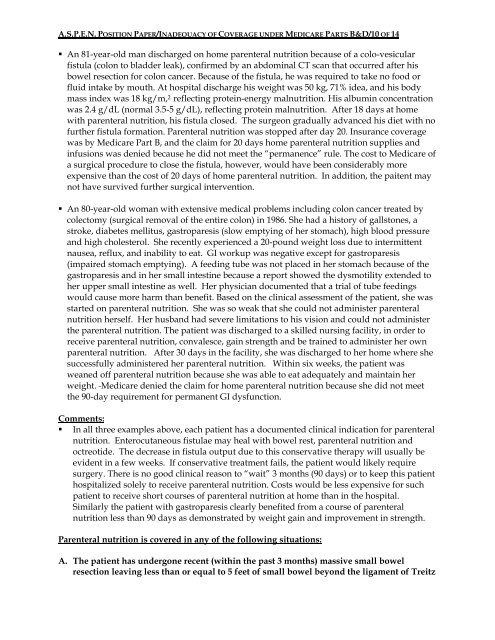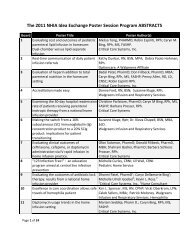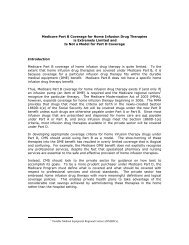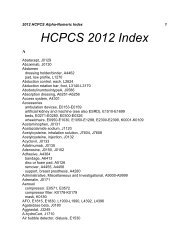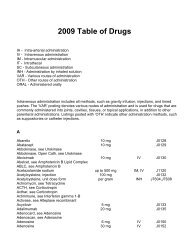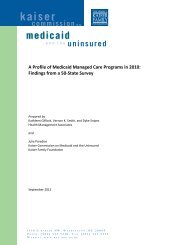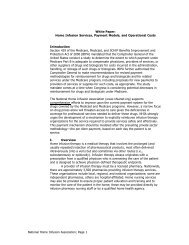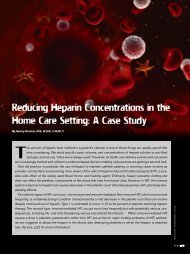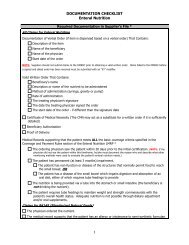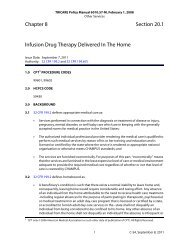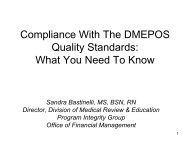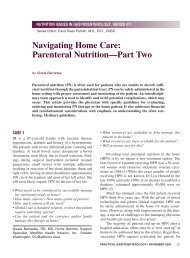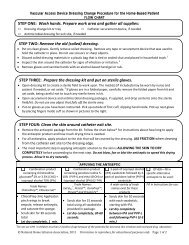Inadequacy of Coverage Under Medicare Part B and - NHIA
Inadequacy of Coverage Under Medicare Part B and - NHIA
Inadequacy of Coverage Under Medicare Part B and - NHIA
Create successful ePaper yourself
Turn your PDF publications into a flip-book with our unique Google optimized e-Paper software.
A.S.P.E.N. POSITION PAPER/INADEQUACY OF COVERAGE UNDER MEDICARE PARTS B&D/10 OF 14<br />
• An 81-year-old man discharged on home parenteral nutrition because <strong>of</strong> a colo-vesicular<br />
fistula (colon to bladder leak), confirmed by an abdominal CT scan that occurred after his<br />
bowel resection for colon cancer. Because <strong>of</strong> the fistula, he was required to take no food or<br />
fluid intake by mouth. At hospital discharge his weight was 50 kg, 71% idea, <strong>and</strong> his body<br />
mass index was 18 kg/m, 2 reflecting protein-energy malnutrition. His albumin concentration<br />
was 2.4 g/dL (normal 3.5-5 g/dL), reflecting protein malnutrition. After 18 days at home<br />
with parenteral nutrition, his fistula closed. The surgeon gradually advanced his diet with no<br />
further fistula formation. Parenteral nutrition was stopped after day 20. Insurance coverage<br />
was by <strong>Medicare</strong> <strong>Part</strong> B, <strong>and</strong> the claim for 20 days home parenteral nutrition supplies <strong>and</strong><br />
infusions was denied because he did not meet the “permanence” rule. The cost to <strong>Medicare</strong> <strong>of</strong><br />
a surgical procedure to close the fistula, however, would have been considerably more<br />
expensive than the cost <strong>of</strong> 20 days <strong>of</strong> home parenteral nutrition. In addition, the paitent may<br />
not have survived further surgical intervention.<br />
• An 80-year-old woman with extensive medical problems including colon cancer treated by<br />
colectomy (surgical removal <strong>of</strong> the entire colon) in 1986. She had a history <strong>of</strong> gallstones, a<br />
stroke, diabetes mellitus, gastroparesis (slow emptying <strong>of</strong> her stomach), high blood pressure<br />
<strong>and</strong> high cholesterol. She recently experienced a 20-pound weight loss due to intermittent<br />
nausea, reflux, <strong>and</strong> inability to eat. GI workup was negative except for gastroparesis<br />
(impaired stomach emptying). A feeding tube was not placed in her stomach because <strong>of</strong> the<br />
gastroparesis <strong>and</strong> in her small intestine because a report showed the dysmotility extended to<br />
her upper small intestine as well. Her physician documented that a trial <strong>of</strong> tube feedings<br />
would cause more harm than benefit. Based on the clinical assessment <strong>of</strong> the patient, she was<br />
started on parenteral nutrition. She was so weak that she could not administer parenteral<br />
nutrition herself. Her husb<strong>and</strong> had severe limitations to his vision <strong>and</strong> could not administer<br />
the parenteral nutrition. The patient was discharged to a skilled nursing facility, in order to<br />
receive parenteral nutrition, convalesce, gain strength <strong>and</strong> be trained to administer her own<br />
parenteral nutrition. After 30 days in the facility, she was discharged to her home where she<br />
successfully administered her parenteral nutrition. Within six weeks, the patient was<br />
weaned <strong>of</strong>f parenteral nutrition because she was able to eat adequately <strong>and</strong> maintain her<br />
weight. <strong>Medicare</strong> denied the claim for home parenteral nutrition because she did not meet<br />
the 90-day requirement for permanent GI dysfunction.<br />
Comments:<br />
• In all three examples above, each patient has a documented clinical indication for parenteral<br />
nutrition. Enterocutaneous fistulae may heal with bowel rest, parenteral nutrition <strong>and</strong><br />
octreotide. The decrease in fistula output due to this conservative therapy will usually be<br />
evident in a few weeks. If conservative treatment fails, the patient would likely require<br />
surgery. There is no good clinical reason to “wait” 3 months (90 days) or to keep this patient<br />
hospitalized solely to receive parenteral nutrition. Costs would be less expensive for such<br />
patient to receive short courses <strong>of</strong> parenteral nutrition at home than in the hospital.<br />
Similarly the patient with gastroparesis clearly benefited from a course <strong>of</strong> parenteral<br />
nutrition less than 90 days as demonstrated by weight gain <strong>and</strong> improvement in strength.<br />
Parenteral nutrition is covered in any <strong>of</strong> the following situations:<br />
A. The patient has undergone recent (within the past 3 months) massive small bowel<br />
resection leaving less than or equal to 5 feet <strong>of</strong> small bowel beyond the ligament <strong>of</strong> Treitz


